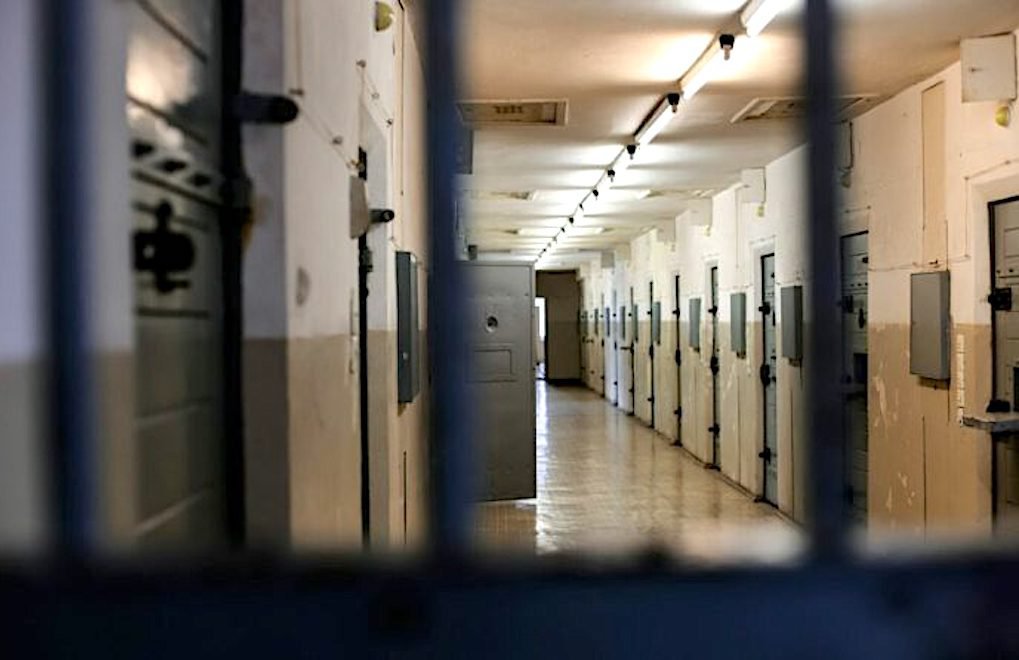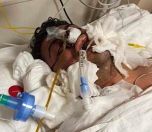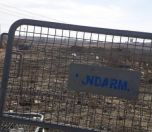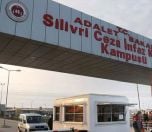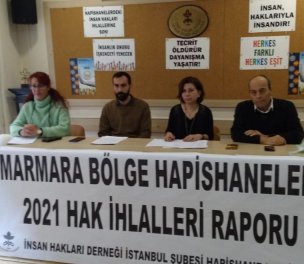Click to read the article in Turkish
The Human Rights Association (İHD) İstanbul Branch Prison Commission has prepared a report regarding the violations of rights based on the complaints from 20 prisons, the ones in the Marmara Region as well as in other regions, in the last three months of 2021.
The violations documented by the İstanbul Branch of the İHD came from the following prisons in October-November-December 2021:
İmralı Type F High Security Prison, Silivri Prison Campus Prisons, Tekirdağ No. 1 and 2 Type F Closed Prison, Edirne Type F, Kandıra Type F, Bakırköy Women's Closed, Balıkesir Bandırma No 1 Type T, Maltepe No. 2 Type L, Gebze Type M, Şakran Women's Closed, Van Type F, Metris Type T, Bolu Type F, Kayseri Women's Closed, Adana Kürkçüler Type F, Kocaeli No. 1 Type T, Urfa No. 2 Type T, Aliağa Yeni Şakran No. 4 Type T, Ümraniye Type E and Konya Seydişehir Closed Prisons.
Violations of rights
Some of rights violations covered by the report are the violations of the right to be protected from torture and ill treatment, right to healthcare, right to communication, right to sufficient and healthy food, right to access to water, right to self-care and right to equality in execution.
Presented by lawyer Jiyan Tosun, Ümmühan Kaya and Davut Arslan on behalf of the İHD İstanbul Branch Prison Commission, the report has shown that the Silivri Prison Campus and Tekirdağ prisons were the ones from which the highest numbers of complaints came.
According to the report, the highest number of rights violations occurred in November 2021. While the report has documented 89 applications, 76 of them are from political prisoners. In the applications, more than one violation of rights were reported: In October, 32 applications were submitted about 1,100 violations of rights; in November, 33 applications were made about 1,268 violations of rights and in December 2021, 24 applications were submitted about 750 violations of rights.
All in all, a total of 2,540 violations of rights were reported to the İHD in this period, according to the last quarterly report of the İstanbul Branch Prison Commission. Taken together with the 578 violations of rights detected by the commission via the press, the total number of violations of rights in the related prisons hit 3,118, including eight violations of the right to life.
Torture, ill treatment, strip search
According to the report, the most frequently witnessed violations were torture, battery and ill treatment, which were followed by the imposition of a "terror" identity, reprimands and investigations for arbitrary reasons and forced transfers to other prisons. The report has shown that at least 85 people were transferred by force while 50 people were subjected to torture and 126 people were faced with a reprimand or investigation.
Among the physical assaults were threat, battery, strip search, raid, searches in cells, torture, ill treatment, racist and discriminatory attitudes, threats with death and police involvement in cell searches. The report has also documented the incidents where prisoners were forced to be counted on foot like in the military and violations of right to healthcare and treatment.
The İHD İstanbul Branch Prison Commission members have noted that the most frequently encountered rights violation was strip search in these three months. They have underlined that "during the strip searches, the officials wanted to look in prisoners' mouths; the ones who did not accept strip search were subjected to torture and stripped off by force; they were ordered to kneel down and when they did not accept it, they were subjected to torture going beyond a physical assault."
The report has said that the ones who resisted strip searches were faced with lawsuits for resisting a public official on duty while the complaints of prisoners were given decisions of "non-prosecution".
According to the report, with the outbreak of the pandemic, "destructive practices targeting the social existence of arretees and convicts" have been the case in all prisons with their contact and links with the outside world, including their families, are severely undermined.
Raising concerns about isolation, the report has also noted that even though the prerequisites for a supervised release and transfer to open and semi-open prisons are set, prisoners are commonly deprived of these acquired rights in the name of "good conduct" assessments. (AEK/SD)




